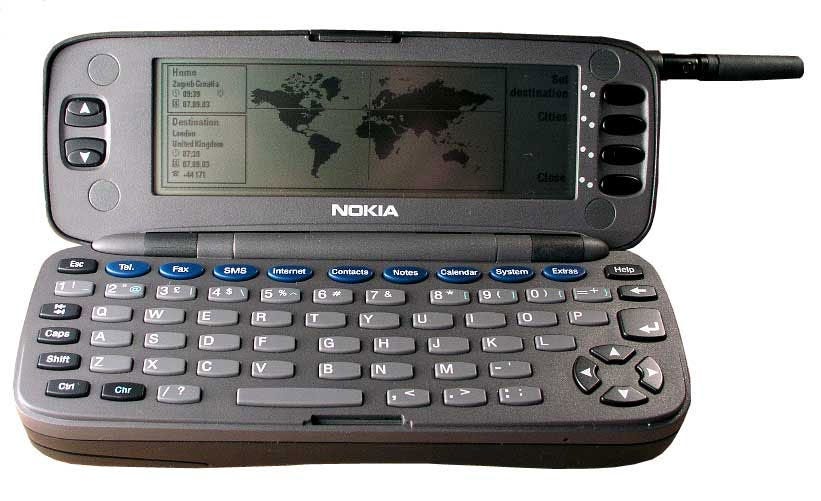Phones Desperately Need More Innovation
I'm getting so tired of the same stuff
How about the first thing we do is drop the word smartphone? The “phone” aspect of the mobile computers we all care is a tiny part of what they are now. What we carry in our pockets originally started as phones first but have morphed into nothing but full on computers.
I recall every phone I’ve ever owned. My very first was an Ericsson GF 768 on T-Mobile. Back in 1998 when I got it, T-Mobile was the only GSM (the international standard for cell phones) carrier in the US and their phones were significantly more advanced than others. I’ll never forget my awesome Ericsson T28 either. Even by today’s standards, it was a super small phone that worked really well.
Then I got a Nokia 9000iL communicator in 1999.
This was before cell networks actually had data. So to connect to the internet, this phone had a built in modem. You put in your ISP’s details and it dialed in and connected to the internet over your cell phone line. It was breathtaking technology. I had mobile email, web browsing, sms, and even fax capability in 1999. I would trade stocks in class in high school. I saw the future and even experienced it at an early age. Later in high school I got a windows mobile device. On it, I played music, would watch tv shows or feature length movies, and could take photos. Again, this was all prior to 2002.
The years between 2002 and 2007 when the iPhone was released were amazing for cell phones. Each device brought new and exciting innovations. I remember sending my first image messages to friends from a Sony Ericsson P90. It was also the first phone I took a very grainy video of my friend doing Karaoke on. Again, I saw the future.
So when the iPhone came out, I had a Nokia E90. It actually had a working version of Excel on it that was extremely useful during business school. Not to mention a large app ecosystem and lot more capabilities than the iPhone had at launch.
However, Apple’s marketing and cache meant the iPhone became all the rage. Other manufacturers were too set in their ways and fell behind. In reality, the success of both the iPhone and Android can really be attributed to having a vast ecosystem of apps which they only have because they are attractive platforms with billions of users. No other phone ecosystem came close to replicating what iOS and Android did.
The problem is now we’re stuck with this duopoly and have been for a while.
And I’m getting tired of the horrendous mismanagement of the capabilities of the devices in our pockets.
I’m an iOS person so this is mostly going to come from that perspective.
Every year, like clockwork, Apple releases a new version of its operating system and then phones to run it on.
And honestly, not much has changed in a long time. I remember a number of years where I upgraded from an X to an XS to a 12 to a 14 and was not very impressed by any of the improvements in hardware or software. I distinctly remember getting my 14 and expecting to be blown away by a 120hz screen. Spoiler, I was not and got used to it in a few hours. In fact, my upgrade to the 14 was notable in how rapidly I didn’t care about my new phone. Hundreds of millions of other people around the world are similarly holding on to their phones for longer as the upgrades are not worth it anymore.
I did actually upgrade to the 15 this year for what I think is the most useful feature Apple has released in a long time. On the 15 when shooting in portrait mode, you can pick the focus point. This has dramatically changed how I take photos on my phone (including those that aren’t portraits) and actually made me enjoy a new iPhone for the first time in a long time.
Here’s a photo I took last week on my 15 that I would not have been able to get with a lesser iPhone.
That being said, when you think about it, very little has changed in iOS since its release. The Home Screen, unless you are using widgets, is basically a grid of apps or folders. You go in and out of one app at a time which takes up the whole screen, the keyboard is the same, and heck a lot of the apps initially included on the original iPhone are almost identical except their design language. When you think about it, all of the biggest changes are the additional use cases these devices have from companies like Uber, Instacart, CVS, Facebook, IG, TikTok, and thousands more. It’s the apps that really determine how we use our phones in our day to day life, not the innovation by Apple or Google.
Admittedly, I’ll give a lot of credit to Apply Pay which has become indispensable. In fact, I adore my Apple Card since its integration into the Wallet app is better than any other credit card or banking app on my phone. So, credit where credit is due. (There’s a really bad pun in there about credit)
But when you consider it’s been 15+ years since the iPhone was originally released, the fact that’s it’s still a slab of glass with apps all organized the same way is kind of remarkable. And that’s what annoys me. You’re telling me in 15 years we haven’t found a better way to compute on mobile? I may be a huge nerd and power user, but these days my iPhone gets in my way a lot by not letting me quickly move between lots of apps, clunky copy/pasting when apps need to share a lot of data, and the fact that anything requiring more than touch and only a little text entry is done significantly better on a laptop.
I’m well aware some of this might be easier on an Android, and I’ve tried to make the switch 3 times only to always go back to iOS. Currently, I can’t imagine losing FaceTime (among other features like my Apple Card) which I use several times a day so I am locked into this ecosystem for now.
Apple has mountains of money and the tiny incremental additions they have to the software and hardware each year are mind boggling to me. It seems like they are happy to be complacent with their market share. It’s also hard for me to give examples of what exactly I’d like to see added. Better multi-tasking, a more dynamic Home Screen, and a dual screen device (two opposing screens) are at the top of my list. Everything is software related though. The hardware is very advanced and capable.
In fact, I got one of the new 13” M4 iPad Pros this past week. As seems to be Apple’s current MO, the hardware was absolutely stunning, but the software is horrendous. I’ve tried a Samsung Tab Ultra and its multitasking features are lightyears beyond iOS. So again, it’s not really the hardware but a lack of innovation in software.
Although…things are about to change a lot.
See, earlier this year Samsung released the Galaxy S24 Ultra and alongside it a ton of new AI features. First off, the S24 is such incredible hardware to this day I still want to pick one up. It simply outshines the iPhone in almost every way. But the AI features are truly impressive. You know how when you rotate an image, it crops out areas? Well, the AI on the S24 keeps the areas that are cropped out and then uses generative AI to fill in the new blank spaces created. And it works really well. You can also edit out plants, animals, and even whole people quickly and easily. While to me what you can do with photos is what’s most impressive, there are lots of other AI features like real time translation on phone calls, dictation and meeting summarizing, etc..
FINALLY
Someone started doing some NEW stuff! And you could feel that Apple noticed. Their entire tone about this year’s upcoming OS became about AI. Rumor has it Apple has inked a deal with OpenAI to incorporate GPT-4 heavily into iOS 18. However, the features that are rumored to be powered by it are disappointing so far given how cool Samsung’s features are. The ChatGPT app also already allows you to do a bunch of AI stuff so only time will tell if iOS really gets some shiny new toys. I expect that they will make this AI eventually available to developers which is when we’ll really see it take off.
That being said, I think more research needs to be done in terms of device design as we’ve had this same glass plate for 15 years now, more examination of advanced ways of interacting with apps as well as organizing them, and better interoperability between apps. The sandbox approach iOS uses is seriously getting old when I need to share a lot of stuff between apps.
If it weren’t such a high bar, I’d say there’s actually a great opportunity for a 3rd player to come in and shake up this ecosystem. Considering even catching up to where iOS/Android are would take probably 5 years or more of development by a huge team, that sadly isn’t going to happen. In fact, it’s the massive ecosystem of apps that makes such a move almost impossible so no one can compete against Apple and Google anytime soon. Which is a shame because I firmly believe if we put more research into it, we could have significantly more advanced operating systems and ways of computing while mobile.
One can dream. Happy Memorial Day.



